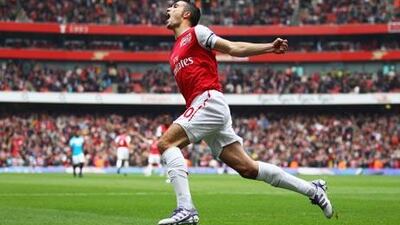Think of Arsene Wenger's Arsenal at their finest and the defining qualities are pace and style. While the numbers of those who bear comparison with the recent Gunners greats make for a diminishing band, they are headed by Robin van Persie.
It was fitting, then, that Sunday's win over Sunderland was notable for speed - his goal after 29 seconds was the Premier League's fastest since 2007 - and elegance, the lovely waft of a left foot that sent his decisive free kick past Simon Mignolet.
When Wenger first described Van Persie as a player who could be a hybrid of Dennis Bergkamp and Thierry Henry, it sounded hyperbolic. Now it seems rather more realistic.
One punning conclusion was that Arsenal have become a "one-van team".
Another, more established theory is that they have excelled at either end of the pitch this season - Wojciech Szczesny's brilliant save from Lee Cattermole was another crucial factor in the 2-1 triumph - but the nine men between the spearhead and the shot-stopper have been found wanting.
Like every generalisation, it is not completely true, but it does indicate Van Persie's importance.
Not that Arsenal need reminding. A Cantona-esque chip that hit the post was a wonderful illustration of artistry. Had it been inches to the right, he would have ended the afternoon with a hat-trick.
Still, the goals are coming at a prodigious pace; with 22 in his last 23 league games, Van Persie has a claim to be the division's outstanding player. More pertinently, he may be the most important to his employers.
Manchester United can compensate when Wayne Rooney is absent and Manchester City can win without Sergio Aguero, but Arsenal's alternatives to their top scorer are altogether less enviable.
Neither Park Chu-young nor Marouane Chamakh is equipped to partner with or deputise for the captain.
With his fondness for roaming deep, ability to create and, typical of Arsenal, the unselfishness to eschew a shot if another is better placed, Van Persie is far from the conventional centre-forward.
His position has long been a subject for debate, with even Arsenal's last Dutch master, Bergkamp, weighing in with the suggestion that his compatriot should begin behind an out-and-out striker.
Yet the discussions should be ended. While much he does now is criticised, it is time to acknowledge Wenger was right.
Van Persie's goal return indicates his prowess, while his many attributes enable a fragile side to select another midfielder by operating as a one-man forward line.
It is a matter of contention, too, that he is leading from the front, partly because Arsenal have no modern-day Tony Adams or Patrick Vieira and partly because the club captaincy has become a stop-off on the route to the exit.
Vieira, Henry and Cesc Fabregas left the armband behind when they headed for pastures new. Followers of trends inevitably conclude that Van Persie, whose contract expires in 2013 and who has yet to begin talks about another deal, will be next.
Player and manager insist that such is not the case, Van Persie saying he has bought a new house in London and pointing to his long-term loyalty. Yet reasons for fidelity are less numerous than they were.
Should Arsenal be stripped of Champions League football next season, one more will disappear.
Should Van Persie, who has started less than half their league games since his 2004 arrival from Feyenoord, be injured again, then the possibility of a top-four finish may become remote, indeed. Had he not sunk Sunderland, it is doubtful any of his colleagues would have done.
It is the context as well as his contribution that makes Van Persie irreplaceable for Arsenal.
Wenger once had an array of talent but with Jack Wilshere injured, Andrey Arshavin (in particular) and Theo Walcott frustrating some and Gervinho adjusting to life in England, his shooting star certainly shines the brightest. The worry is that too few others are as luminous.
¿¿¿
Signings can both create problems and solve them, as West Bromwich Albion's derby victory over Wolverhampton Wanderers showed.
Last season's inspired buy was Peter Odemwingie, the £1.5 million (Dh8.65m) recruit who responded with 15 goals. This year's addition in attack has been Shane Long, the £4.5m arrival from Reading.
Roy Hodgson, the head coach, may not have concluded that the pair are incompatible, but it is noticeable that the Irishman has been at his most effective when the Nigerian has been absent.
While Odemwingie came off the bench to score the second goal at The Hawthorns, Long led the line brilliantly, wearing the Wolves defence out before his fellow forward came on to strike the decisive blow.
¿¿¿
The weekend's other decisive derby saw Bolton Wanderers elevate themselves from the foot of the table with a 3-1 win at Wigan Athletic.
On a day of disastrous defending from Roberto Martinez's team, the pivotal incident occurred when Kevin Davies dispossessed the error-prone Steve Gohouri to set up David Ngog for the visitors' second goal.
Gohouri's appearance at left-back was a surprise, and he was promptly replaced by the regular, Maynor Figueroa. But the Honduran's initial omission - following a gruelling trip back from his homeland in the international break - showed the penalty Wigan paid for possessing such a cosmopolitan squad.


